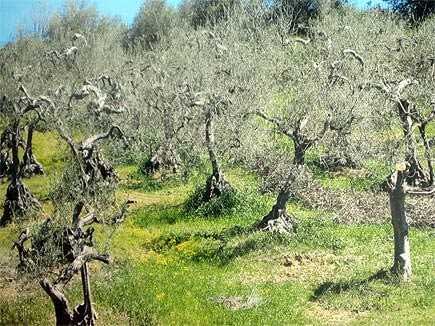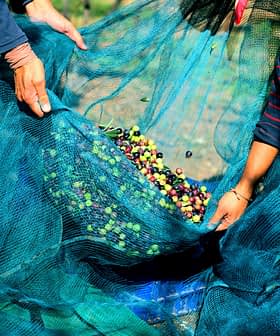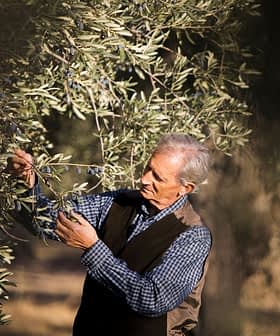This photo of a Molise olive grove, by Tony Figliola, won the Extrascape.jpg photography contest.
Soon after the closing of the New York International Olive Oil Competition, another kind of olive oil competition took place in an isolated and little-known village in the Molise region, in the Center of Italy.
Extrascape is a peculiar competition, set up by Molisextra, a small yet very dynamic producers’ association led by Francesco Travaglini, together with local administrations and a network of Italian Universities studying the landscape under its aesthetic, functional, environmental and economic aspects.
It is the first international olive oil competition that not only awards the best extra virgin olive oil, but also the best olive landscape, according to different criteria including sustainability, biodiversity, respect for the environment and harmony with their surroundings.
The 2013 edition followed last year’s guidelines: while two expert panels – the oil tasting and the landscape one – examined and evaluated oils and pictures coming from all over the world with a preponderance from Italy and Spain, the ancient castle of the village now converted into a public building hosted an interesting archaeological exposition about oil and wine production and consumption in the local area, and a number of conferences and workshops.
On day one, a number of scientific speakers such as Prof. Maurizio Servili (University of Perugia), Prof. Claudio Massimo Colombo (Molise University) and Dr. Biagio Zullo (Science and Technology Park of Molise) reported about the Italian olive oil quality parameters and potentialities, and about the possible uses of olive pomace and wastewater deriving from olive milling.
On day two, speakers discussed olive oil quality in its different aspects. General Cosimo Piccinno (anti-sophistication corps of Carabinieri) and Lieutenant Colonel Amedeo De Franceschi (Corps of forest rangers) talked about the danger of frauds and food adulteration and the investigative and operative tools to prevent and repress them, also pointing out that the origin certification is one fundamental asset to preserve both consumers’ safety and producers’ job. This perfectly aligns with the importance of preserving and endorsing the land and landscape where olive oil is born, connecting products, places and people.
Prof. Achille Ippolito (La Sapienza University of Rome and coordinator for the inter-University Sapienza- Tuscia and Molise University Ph.D. in Environment and Landscape Planning and Management) spoke about well-being and landscape quality, based upon the cultural traceability.
Angela Galasso, representative of Aicare (Italian Agency for Rural Sustainable and Ethical Agriculture) talked about the Association’s activities and introduced the Olio Giusto (Fair Olive Oil) Award that will be appointed to the most “ethical” olive oil cooperative producer joining the network.
Gino Celletti, the panel leader at the New York competition, illustrated the potentialities of several local varieties (Molise counts 19 different cultivars) while Himeyo Nagatomo – a Japanese professional taster, and part of the international jury – talked about the confused regulation of olive oil in Japan.
On day three, just before announcing the awards, the PhD students presented the results of their workshop about tourism, culture and extra virgin olive oil, proposing interesting projects for the touristic and cultural exploitation of Molise, a land full of natural beauty, excellent products and traditions.
For the competition, fifty-eight extra virgin olive oils coming from different areas – from Molise to Uruguay, were evaluated according to the fruity and conventional or organic cultivation. Those assessments were then combined with the results of the landscape experts, evaluating pictures of olive tree groves and oil mills divided into the traditional (wild) or innovative (high-density) categories.
Results showed a strong correlation between the quality of a farm’s landscape and the oil it produced. Spain and Italy won almost every category, even if Spanish farms appeared to be better than Italian ones at taking care of the landscape and displaying it, with some exceptions of course.
A special award was given to Agroland Cultivos from Uruguay, whose landscape was considered “a model” by the landscape jury.
2013 Extrascape Winners
Gran Premio Extrascape 2013: Mueloliva Venta del Barón (Spain)
Special Award Extrascape 2013: Agroland Sa (Uruguay)
Special Award Oil Mill Architecture: Tenuta Venterra (Apulia)
Conventional Farms Traditional Landscape
Light fruity:
Masseria Maresca Dop Colline di Brindisi (Apulia)
Tamaro Giorgio, Oliva Nera di Colle Torto (Molise)
Marina Colonna Dop Molise (Molise)
Medium fruity: Potosi 10 Fuenroble (Spain)
Intense fruity: Mueloliva Venta del Barón (Spain)
Conventional Farms Contemporary Landscape
Medium fruity: Casas de Hualdo – Picual (Spain)
Intense fruity: Oleificio Silvestri Ascolana Tenera (Marche)
Organic Traditional Landscape
Light fruity: Masseria Maresca Bio (Apulia)
Medium fruity: Il Frantoio di Vicopisano IGP Toscano Bio (Tuscany)
Intense fruity: Rincón de la Subbética ( Spain)
Organic Contemporary Landscape
Medium fruity: Oro del Desierto (Spain)









